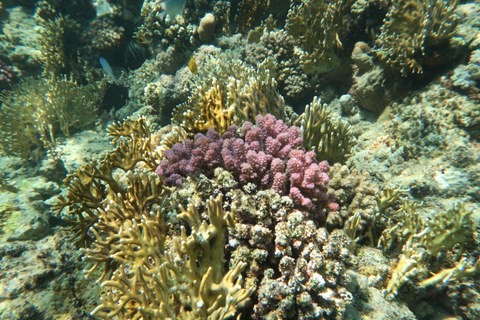May 25, 2024
Animals and Money: How Coral Reefs are Benefiting Egypt’s Economy

Coral reefs are one of the most diverse and productive ecosystems on earth. With diving tourists and fishery the Egyptian economy profits enormously from the reefs in the Red Sea. Sadly corals are threatened by agricultural fertilizers and climate change.
Coral reefs are one of the most diverse and productive ecosystems on earth. They are home to more than 25% of all marine species and provide essential ecosystem services to millions of people worldwide1. Corals are animals, specifically small polyps that often live in colonies. Reef-building corals are stony corals, meaning they create hard structures from calcium-carbonate. On this skeleton, new polyps can settle and over time create a coral reef. Stony corals live in symbiosis with microalgae – a mutually beneficial relationship. The microalgae living inside the coral provide energy building blocks and in turn receive nutrients, CO₂ for photosynthesis, access to sunshine and protection from grazers2. Coral reefs offer hiding and nursery spaces for smaller fish, thereby protecting them from predators and supporting the fish stock. The corals’ complex structure affects the current, water temperature and light distribution of their surrounding3. This way, corals provide suitable environments for many different species1.
Despite only carrying 5% of the world's coral reefs1, the Red Sea is defining for Egypt's tourism and fishing industry. Marine fisheries are a small sector of Egypt's economy, contributing 0.16% of the country's GDP in 2010, of which the Red Sea region accounts for 38%4. It is estimated that 25% of fish stock relies in some way on coral reefs1. Any destruction of coral reefs would reduce fish stocks and fishing activities. Therefore, the loss of coral reefs would probably reduce the whole GDP by 0.015%. A larger share to Egypt´s economy comes from tourism, amounting to 7.7% of the country´s GDP in 20225. Over 90% percent of tourists are beach tourists, but reef tourism is also significant6. Because of the large species biodiversity and its “bucket list” reputation7,8 it can be assumed that all diving tourism relies on the Red Sea’s coral reefs. Supposing there remains 10% of tourists, and they are there specifically to dive at the reef, around 0.77% of the country´s yearly GDP depends on the corals. Egypt´s nominal GDP of 2022 was 4.356 billion US$9. Assuming GDP values of marine fishery remained stable over the years, reef fishing and reef tourism together make up 0.785% of the GDP. The Red Sea coral reefs would provide a benefit to the Egyptian economy of ca. 34.1million US$ annually.
Sadly, coral reefs are under threat globally and Egypt is no exception. One of the main reasons for coral reef health decline is the increasing growth of macroalgae. They shade the corals1 and impede the energy production of the corals´ symbiotic microalgae. The reason for this algal bloom is excessive use of fertilizer in agriculture. Fertilizer seeps into bodies of water, causing an abundance of nutrients for algae. In combination with rising ocean surface temperatures, algal bloom eventually leads to coral bleaching1. This is when stressed corals expel their beneficial microalgae as a defense mechanism, but in turn deprives them of energy production and causes the coral´s death2. The Red Sea reefs are among the least affected by coral bleaching, with only 4.1% of corals showing long term decline1. A reason for this slower decline is the widespread growth of the hard coral Stylophora pistillata that only starts bleaching at higher water temperatures of 33-34°C10.
The importance of their coral reefs has not gone unnoticed by Egypt and protection measures have been put in place. Maintaining fishing and diving tourism as an important stream of income while preserving coral reefs needs to be carefully balanced. Corals can easily break off and even trained scuba divers sometimes destroy corals11. Once destroyed, the corals grow very slowly, between 0.3 – 10 cm annually12. This is why in 2022 Egypt has launched a pilotproject to propagate broken coral pieces in nursery stations and later reintegrate them into reefs11. Additionally, dive tourists in marine national parks must pay a fee that goes towards animal and environment protection. Although the Red Sea reefs have shown resilience to coral bleaching, they are still under threat. To keep the substantial revenue stream Egypt must prioritize the conservation of its coral reefs and continue sustainable practices to ensure the corals´ health, as well as develop new practices, like making conservation zones inaccessible to divers.
Leonie Hobohm
Issue 20
